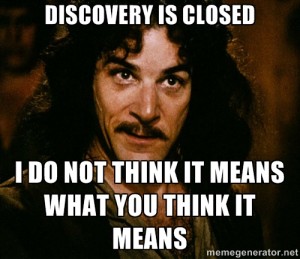Labor Code section 5502(d)(3) says that discovery shall close on the date of the mandatory settlement conference. “Evidence not disclosed or obtained thereafter shall not be admissible unless the proponent of the evidence can demonstrate that it was not available or could not have been discovered by the exercise of due diligence prior to the settlement conference.”
The language is pretty straight forward, no? Do your job, don’t waste the court’s time or the time of the other parties, and either explain why you need discovery to be left open, or re-up on your attorney malpractice insurance. Right?
Well, the term “discovery shall close” is apparently not as clear as a workers’ compensation defense attorney’s conscience.
The case your humble blogger is allowing to ruin his weekend is Rios v. Jones, a recent split panel decision in which two of the three WCAB commissioners ruled that applicant’s exhibits could come in, even though they were obtained after the date of the MSC.
The pertinent facts are as follows: applicant allegedly sustained an injury in 2006, and applicant’s counsel’s attorney filed a DOR to proceed to an MSC, which was held in January of 2012. The matter was continued repeatedly for various reasons, including, at one point, to obtain vocational rehabilitation evidence.
At a March 19, 2013, hearing, applicant testified that his symptoms had gotten progressively worse since as early as March of 2012. But he didn’t bother obtaining additional medical reports at that time, and the matter was ultimately submitted for a trial in October of that year. In fact, it appears, based on the WCJ’s report, that the first effort to obtain additional medical reports started in July of 2012. The WCJ ordered discovery closed and excluded the supplemental reports.
The majority panel, however, disagreed. Reasoning that the majority of medical reports in this case were from 2007 or earlier, and applicant had been waiting to go to trial since late 2011, that this provides good cause to reopen discovery.
However, the WCAB limited this floodgate to previously disclosed physicians and their supplemental reports, rather than newly found vocational rehabilitation experts and doctors.
The dissent (if you want to know what really happened, always read the dissent), would have denied reconsideration, noting that applicant only disclosed his worsening condition and the need for vocational rehabilitation analysis after settlement negotiations fell through. Also, this information was discoverable before – applicant could have sought a re-evaluation at any time, but chose to wait four years since his last treatment to seek a new visit.
This decision is fairly new – having only been issued in late March of 2014. Who knows if the parties will seek review, but as this appears to be one of those uninsured cases, your humble blogger doubts there is anyone with a pocket deep enough to finance a petition for writ of review.
My name is the Humble Blogger, you’ve read my posts, prepare to cry…

